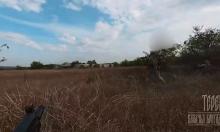Thailand releases nine endangered Thamin deer with radio collars
Thailand on Friday released nine critically endangered deer from a species that vanished from the wild three decades ago, in a bid to bring ecological balance to one of the country's national parks.
The nine Thamin deer were released with radio collars into Huay Kha Khaeng Wildlife Sanctuary in central Thailand. They joined 25 others which were set free in May as part of a five-year program by the Thai government and universities, the Smithsonian's National Zoological Park and the Wildlife Conservation Society established to save the deer, which have disappeared in the wild in Thailand but still remain in neighboring Myanmar.
"If we don't do this, the deer will go extinct forever," said Boripat Siriaroonrat, research veterinarian at the state-sponsored Zoological Park Organization, who took part in the release. "Somebody needs to bring them back. They are a missing piece of the ecosystem."
The deer - famous for males which have C-shaped antlers - were once a common site in Thailand but were driven to near extinction by habitat loss and hunting. They are part of a family known as Eld's deer which includes the Sangai deer in India and the Siamese Eld's deer in Cambodia and Laos.
Anak Pattanavibool, Thailand country director for the Wildlife Conservation Society, said the deer will complement five other species of hoofed animals that leopards, tigers and wild dogs depend upon for prey.
"To get them back into the wild is good," Anak said. "In the end, it will complement the system and benefit the conservation of the whole wildlife area." About 1,000 of the deer live in Thai breeding centers.
Long before their release, Boripat said authorities took a number of steps to ensure the deer would survive.
They carried out a series of controlled burns to create the open spaces the deer prefer so they can scan for predators. They also ensured the herd had genetic diversity and screened them for diseases such as tuberculosis and foot and mouth disease.
Boripat said it is too early to say whether the program is a success, acknowledging that a handful of the deer have been killed. "Some have been taken by leopards but that is a function of the ecosystem," he said.
If the program goes well and the deer establish themselves in the park, Boripat said the government is considering releasing hog deer _ which are limited to one park in the country's northeast _ as well as Sarus cranes.
"We feel responsible to take this challenge into our hands and do something about it," he said.
Subscribe to Pravda.Ru Telegram channel, Facebook, RSS!



